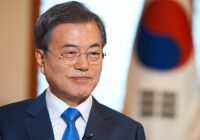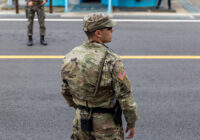Like the Vietnam conflict, the Korean War’s long shadow could impact US foreign policy for decades to come.
Imagine for a moment that Kim Jong-un isn’t really an evil communist dictator, but a Confucian king ruling a capitalist monarchy. Imagine that positive reforms were taking place in a newly designed North Korea that doesn’t place the military first anymore. Then imagine that the Korean Peninsula suddenly found itself in a rare posture, where both leaders called adamantly for high-level talks about ending the 65-year-long conflict and reunifying. Then try to fathom the consequences of the armistice-holding United States missing the opportunity to broker peace between the two — instead imposing more sanctions at this crucial moment — and Russia sweeping in to facilitate the unification process to its geostrategic advantage.
What side of history would the US be on, and what future would America have in Asia if this happened?
These considerations aren’t fiction. They’re part of a legitimate, possible future. And the US is faced with the option of allowing this to happen, or taking an entirely new approach to North Korea and the Korean War. An approach toward brokering (admittedly idealistic) genuine peace and unification, not “peace through conflict” as it currently stands.
US policymakers have consistently prescribed faulty remedies in dealing with North Korea and the Korean War — from the collapse of the Agreed Framework and the Axis of Evil speech, to the failed Leap Day Deal and the Obama administration’s misguided “strategic patience” policy. While it is understandable that the US views the Korean conundrum as a “North Korea problem,” that perspective doesn’t contribute to resolving the roots of the ongoing conflict.
Washington remains “strategically patient” toward North Korea while the country continues to develop its nuclear weapons program and commit human rights abuses, which are gradually improving. The strategic patience policy is a gross byproduct of media sensationalism, human rights politics and counter-productive nuclear nonproliferation gridlock.
North Korean diplomats warned the UN rapporteur, Marzuki Darusman, that hardliners would come to power if the US-led global approach to the country continued in this current trajectory. Although this is probably an empty threat designed to leverage the international community, it represents a future that is further preoccupied with perpetual bellicosity.
An example of misguided policies backfiring on the US agenda is in its most serious qualm with North Korea: the nuclear weapons program. In 1957, the US abrogated section 13(d) of the Korean Armistice Agreement, allowing nuclear weapons on the Korean Peninsula. Since then, the US has failed to put that genie back in its bottle, and instead spent decades bickering on the Hill about how to engage the regime whilst North Korea developed its own program. Seoul National University Professor Park Tae-gyun suggests the only way to end hostilities is to replace the armistice with a peace treaty.
As the nuclear program provides the North Koreans with security and bargaining chips, they will likely never get rid of it. North Korea has weapons of mass destruction whether the US accepts it or not, and the program will only continue growing. Rather than stand in denial with fists clenched over this fact, the US should rush to broker peace on the peninsula. During the reconciliation process, the US could leverage developmental programs in exchange for nuclear disarmament, thereby replacing the country’s nuclear blanket with an equally warm developmental one.
The US government cites North Korean behavior as justification for furthering its geostrategic interests in Asia. But to what effect, and is the current US approach optimal?
Stephanie Klien-Ahlbrandt testified before the US-China Economic and Security Review Commission that Beijing and Pyongyang hold “perpetual American hostility” responsible for the perceived necessity of their security apparatus. In testimony, she quoted the old Chinese proverb: “The one who ties the knot is responsible for untying it.”
On the peninsula where the Korean War is still technically being fought, the leaders of its opposing forces are focused on entirely different dialogue than Washington. Calls for an inter-Korean summit from South Korean President Park Guen-hye and North Korean Marshall Kim Jong-un have aligned the Koreas in rare posture toward political rapprochement of relations. These talks have the potential of achieving mutual recognition, which would be the first step toward ending the Korean War and unifying the country. A Unification Charter has even been created to support inter-Korean inertia toward peace.
The Long Shadow
In his recent State of the Union address, US President Barack Obama highlighted the counter-productive impact that sanctions have historically had on Iranian and Cuban reforms, noting that shifting policy could “end the legacy of mistrust” between the countries. In an article for The Washington Post, former US President Jimmy Carter called this strategy “cruel to innocent people.” He argued that the (contested) Sony hack, which the upgraded North Korea sanctions are based on, is no justification for these “counter-productive measures.”
Eun-sung Soh suggests it is “time to move away from simplistic thinking” on North Korea. Perhaps it is time to reimagine North Korea, as Shine Choi so saliently argues, and support the Ministry of Unification in its effort to “spread the seeds of peace on the Korean Peninsula.”
Some scholars aptly argue that engaging the regime earns positive rewards. Others add that replacing the armistice with a peace treaty is the best solution to ending the war. While the gains of engagement are quantifiable because they’ve been tested, peace has not. Peace has no record to argue for or against. Since replacing the armistice with a peace treaty may not be in the best political interest of both Koreas, the US should instead strive to facilitate peace between the countries.
As a third rail issue, the American public will have difficulty supporting a sudden shift toward engagement from a “vicious to virtuous cycle” with a nation that we’ve long demonized. It would require Americans to consider North Korea’s perception of reality — which would require recognizing the country as a rational actor and a product of its environment that did what it needed to survive independently after 35 years of occupation and another 65 at war.
Granted, putting ourselves in the shoes of such a demonized regime is unfathomable to some, but the prospect is there. North Korea’s “enemy,” South Korea, is leading the public diplomacy effort by promoting peace on the peninsula.
Like the Vietnam War’s “Long Shadow,” the Korean War’s long shadow could impact US foreign policy for decades or even centuries to come. America’s fate in Asia may be determined by its ability or inability to serve as a facilitator in the inevitable end of the Korean War.
Washington’s obligation to the conflict goes beyond geostrategic interests or petty domestic politics. The US government has an obligation to communicate this responsibility to Americans — seeking their support for assuming the historical role required of it now that the Koreas have prepared to end the war and unify. It is not a question of imagining possible realities, but recognizing them before they slip into the hands of those seeking to undermine America’s legacy by playing this historically crucial role for us.
We bring you perspectives from around the world. Help us to inform and educate. Your donation is tax-deductible. Join over 400 people to become a donor or you could choose to be a sponsor.
The views expressed in this article are the author’s own and do not necessarily reflect Fair Observer’s editorial policy.
Photo Credit: Sean Pavone / Everett Historical / Astrelok / Shutterstock.com
Support Fair Observer
We rely on your support for our independence, diversity and quality.
For more than 10 years, Fair Observer has been free, fair and independent. No billionaire owns us, no advertisers control us. We are a reader-supported nonprofit. Unlike many other publications, we keep our content free for readers regardless of where they live or whether they can afford to pay. We have no paywalls and no ads.
In the post-truth era of fake news, echo chambers and filter bubbles, we publish a plurality of perspectives from around the world. Anyone can publish with us, but everyone goes through a rigorous editorial process. So, you get fact-checked, well-reasoned content instead of noise.
We publish 2,500+ voices from 90+ countries. We also conduct education and training programs
on subjects ranging from digital media and journalism to writing and critical thinking. This
doesn’t come cheap. Servers, editors, trainers and web developers cost
money.
Please consider supporting us on a regular basis as a recurring donor or a
sustaining member.
Will you support FO’s journalism?
We rely on your support for our independence, diversity and quality.









Comment